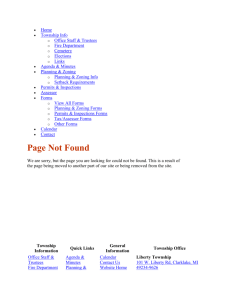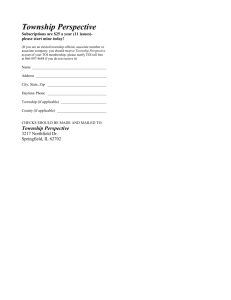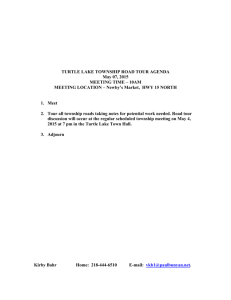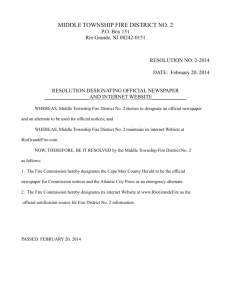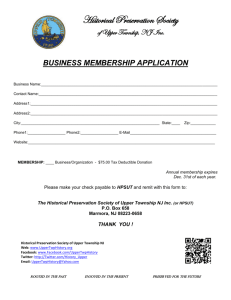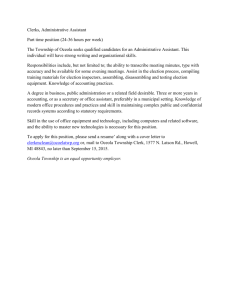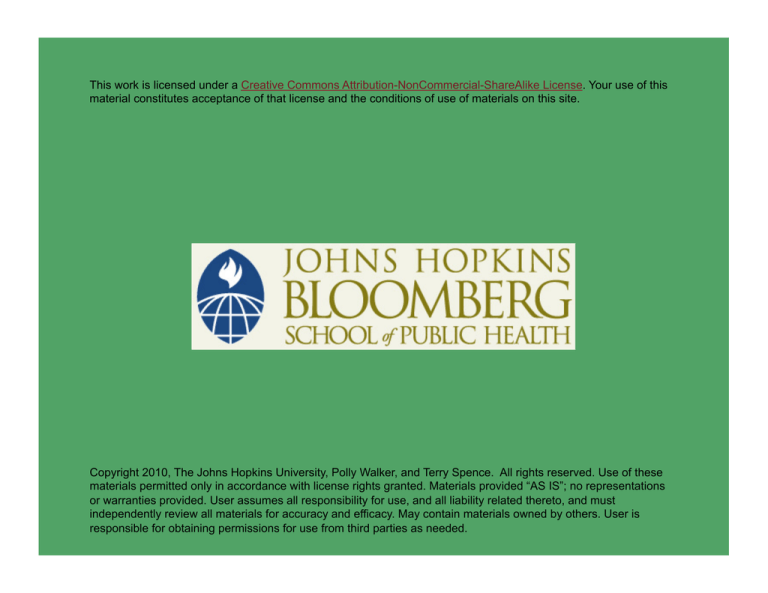
This work is licensed under a Creative Commons Attribution-NonCommercial-ShareAlike License. Your use of this
material constitutes acceptance of that license and the conditions of use of materials on this site.
Copyright 2010, The Johns Hopkins University, Polly Walker, and Terry Spence. All rights reserved. Use of these
materials permitted only in accordance with license rights granted. Materials provided “AS IS”; no representations
or warranties provided. User assumes all responsibility for use, and all liability related thereto, and must
independently review all materials for accuracy and efficacy. May contain materials owned by others. User is
responsible for obtaining permissions for use from third parties as needed.
From Farmer to Advocate
Terry Spence
Citizens Legal Environmental Action Network (CLEAN) and
Family Farms for the Future (FFFF)
With Polly Walker, MD, MPH
Terry Spence
Operates a second-generation
family farm in Missouri raising
cattle
President, Citizens Legal
Environmental Action Network
(CLEAN)
President, Family Farms for the
Future (FFFF)
Assistant Director, Socially
Responsible Agricultural Project
(SRAP)
Selected as one of the Thirty
Heroes for each of the thirty
years of the Federal Clean
Water Act
3
A Family Farm in Missouri
Photo by Hernan Vargas. Creative Commons BY-SA.
4
Lincoln Township, Mo.
Source: http://www.usgwarchives.org/maps/missouri/images/putnam.gif
5
Photos of the Farm
6
What Is a Diversified Farm?
Typical diversified farm
- 30 head beef cattle
-
-
-
12 dairy cows
50–100 sheep
Flock of egg-laying hens
Some row crops grown as supplemental feed
7
Role of Swine in Diversified Farm
Typical diversified farm often included swine
- Reliable and steady income to supplement less predictable
profits from beef, dairy, and sheep due to shifts in market
prices
- “Mortgage lifter”
8
Q: Why Did You Stop Raising Swine?
Stopped raising hogs in the mid 1980s
1985—restructuring of hog industry began
Market access difficult
No longer profitable to try to compete with the new large corporate
“farms”
9
Consolidation of Hog Operations
Total number of farms raising hogs
1985
1985
10
Impacts of Consolidation
More difficult to operate a small family farm
Smaller producers were shut out of the market by the larger
producers
Larger producers controlled finishing operations or filled all
available slots
Better deals available to larger producers making it difficult for
smaller farmers to compete
11
Premium Standard Farms, Inc.
1994—fateful day for my family and Lincoln Township community
Found out by coincidence that the large industrial hog operation
was to be built in his township would be one mile from his property
line
12
Proposed Hog CAFO for Lincoln Township, Missouri
Large corporation bought land in Lincoln Township to build a hogfinishing facility
-
-
96 buildings would house 102,000 hogs
12 lagoons would EACH hold 25 million gallons of waste
Property was within one to two miles of 30 family residences
13
Reaction of the Community
Zoning ordinance adopted to protect the citizens of Lincoln
Township
-
-
Security bond placed on lagoons for clean up of the site and
remediation if hog operation closes or leaves site
Required setback distance from individual homes (21 family
homes within one mile of this proposed operation)
Note: Hog CAFOs were NOT BANNED
14
Results of Zoning Ordinance
Original plan: 90 buildings
- Outcome: 72 buildings
Original plan: 102,000 hogs
- Outcome: 80,000 hogs
Original plan: 12 lagoons
- Outcome: 9 lagoons (holding a total of 180 million gallons of hog
waste)
15
1994—The Legal Battle Begins …
Lincoln Township voted unanimously for the zoning ordinance
Premium standard sued the 150 residents of Lincoln Township for
$7.9 million for taking of property rights
Terry becomes the community member leading the effort—ongoing
for 15 years now
16
Effects of Hog Farms on the Community
Major impacts—all anticipated based on experiences with hog CAFOs
in North Carolina
-
-
-
-
Horrendous odors impacted daily life
Impeded or prevented outdoor activities
Dramatic increase in fly infestations
Increased upper respiratory symptoms
Installation of whole-house air conditioning systems necessary
17
Farmer to Advocate: The Beginning
Why did you make the transition from a farmer to an advocate for
the rights of citizens in your township?
18
From Farmer to Advocate
19
Cost to You and Your Family
What has this 15-year battle cost you and your family?
20
Costs of “Standing for Something”
Main costs and considerations have been …
- Family
-
-
Financial
Community
The biggest cost: lost time spent away from family—children and
grandchildren
21
Financial Costs
Most of the costs incurred have been paid out of pocket with
minimal help from other township residents
Money and time spent battling large, faceless corporations whose
activities are subsidized in large part by taxpayers
22
Community Costs
Not everyone in the community supported the legal challenge to the
CAFO
Split the community
- Some were for it as they stood to gain from the CAFOs
- Others were against it due to odors, cost to them, etc.
23
Why Continue the Battle?
With such a significant toll on you and your family, why did you
continue this battle even though your farm was not adjacent to the
CAFO?
Air emissions and odors do travel—even to farms not adjacent (a
“trespass issue”)
Water issues
24
Citizens of Lincoln Township vs. Premium Standard
Premium Standard sued citizens of Lincoln Township for $7.9
million; dropped when citizens sued them back
Citizens took Premium Standard to county court on the zoning
issues, and lost due to agricultural exemptions (two years)
Appealed to Missouri Supreme Court, lost again because of
agricultural exemptions
25
Zoning Law
Missouri state law
- In 1993, state legislature passed exemptions to 1975 law that
banned corporate farming in the state
-
Townships are granted authority to institute local zoning
ordinances to protect property values and public health
In this case and others, the local zoning ordinances were preempted
by the agricultural exemptions allowed by the state
26
Alternative Legal Strategy
Zoning ordinances would not stand against protections afforded to
“agricultural” operations
A new approach: agricultural operations can be restricted (though
building is not prevented) through county health ordinances
27
David vs. Goliath
Federal challenges based on Clean Water Act
Citizens supported by Department of Justice and EPA
In 2002 the case was set for trial (first one and would have set a
precedent, but tossed out of courts by new federal administration)
Signed on a consent decree for over 10 years
28
Final Resolution of Lawsuit
Consent judgments against the company to require adoption of new
technologies to reduce air and water pollution
Companies have adopted some new technologies
Enforcement—has been difficult to get biofilters on the barns
Consent judgments expire in 2010–2011
29
Socially Responsible Agriculture Project
Vision
- “If you fight something, you have to put forth an alternative”
-
-
Revitalize a sustainable and healthy agriculture and food system
Farmers on the land that tend the livestock, tend the
environment, and value the rural communities and the
environment
30
I’m Just a Farmer
31

